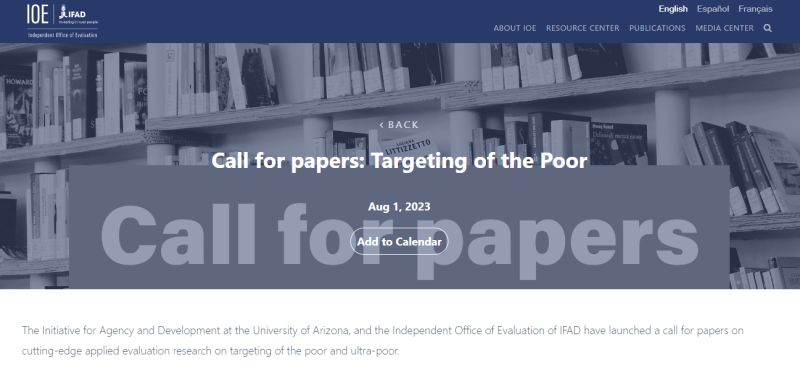Deadline: 01 August 2023
The Initiative for Agency and Development at the University of Arizona, and the Independent Office of Evaluation of IFAD have launched a call for papers on cutting-edge applied evaluation research on targeting of the poor and ultra-poor.
The institutions are co-organizing a conference, Targeting of the Poor, at the University of Arizona, Tucson, Arizona, 8-9 November 2023. The conference will provide a forum for presentation and discussion of the cutting-edge applied evaluation research on targeting of the poor and ultra-poor.
The United Nations 2030 Agenda for the Sustainable Development Goals promotes the “no one left behind” principle of the 2030 Agenda. This requires development efforts to integrate social justice, gender intersectionality and focus on poor people and communities.
Effective and efficient targeting of the poor is a critical step for successful anti-poverty and social protection programs, particularly in rural areas. However, targeting of the poor is challenging, especially in developing countries, because poverty status is dynamic (people and households move in and out of poverty), multidimensional (e.g., it involves income, nutrition, human and social capital, among other dimensions) and challenging to measure, even in monetary terms (part of their income sources are from the informal sectors or remittances, where transactions are hard to track).
Traditionally, anti-poverty and social protection programs have relied on household consumption expenditure survey data to identify the poor. However, such surveys are expensive and suffer from various measurement errors. As a result, alternative methods of targeting have been proposed and utilized, including means testing, proxy means testing, geographic targeting, demographic targeting, self-targeting, and community-based targeting.
In the last twenty years, a significant amount of interdisciplinary literature has emerged on alternative methods of targeting of the poor, including studies that utilize qualitative and quantitative techniques, case studies, randomized experiments, and impact evaluation studies conducted by international development institutions.
I. What to submit?
- They seek papers in the broad area of targeting of the poor and ultra-poor in developing countries.
- Studies focusing on rural areas, broadly defined are strongly encouraged, but other studies will be also considered.
- They welcome papers from researchers and practitioners in economics, anthropology, rural sociology, and related fields.
- They are interested in both qualitative and quantitative analyses; analysis drawing on new primary data or existing secondary data; single or multiple case studies of development programs targeting the poor, ultra-poor and women; high- quality reviews of the literature and research findings; as well as meta-analysis of evidence.
Topics may include the following:
- Who is poor? Who is ultra-poor? The economic, psychological, and social lives of the poor and ultra-poor. Contributions on gender and poverty, ethnicity and poverty, disability and poverty and intersectionality of poverty
- Methods for targeting of the poor (e.g., traditional method of targeting, proxy means testing, geographic targeting, demographic targeting, self-targeting, community-based targeting), and evidence and challenges to the targeting of the poor
- Evidence on successful and not successful cases of reaching the poor, identification of underlying factors and lessons from targeting of the poor from agricultural, rural, poverty, and social protection programs in developing countries in Africa, Asia, Latin America, and Europe.
- We especially encourage authors from low-income countries and women researchers to submit proposals.
II. Where to submit ?
Please send your submission to [email protected] (with cc: [email protected] ) with the subject line: Submission for Conference on Targeting of the Poor.
III. Selection Criteria
The selection committee will review submissions on the following criteria:
- Relevance (alignment with the conference theme)
- Novelty and innovation
- Originality and unpublished work (submissions must be original and should not have been published)
- Papers will be selected to have representation of methodological approaches and perspectives from different fields in social and behavioral sciences.
IV. Publication Plan
- Selected papers will be presented at a conference on Targeting of the Poor, at the University of Arizona, Tucson, Arizona, on 8-9 November 2023.
- Papers presented at the conference will be circulated as the Initiative for Agency and Development (University of Arizona) Working Papers.
- An edited book with a top academic publisher is also planned by the conference’s academic leads.
V. Support/Sponsorship
- Approximately 15 papers will be invited for inclusion in the edited book and each paper will receive financial reward that can be either used towards attending the conference in person or as an honorarium if the authors prefer to attend the conference virtually.
- Another 15-20 papers will be selected for presentation at the conference.
- The conference will provide main lunches and reception dinner.
- Important Deadlines
- Full paper submission is preferred. Extended abstract with a detailed description of data and method will be also considered: 01 August, 2023
- Decision and notification: 30 August 2023
- Full paper submission: 15 October 2023
- Conference Date: 8-9 November 2023
